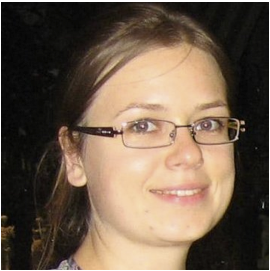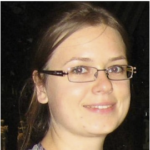
After graduating as a Master of Science (Biochemistry, Molecular Biology, and Biopharmacy) from the Vilnius Gediminas Technical University, Ieva spent three years as an analyst working within the company : Sicor Biotech – TEVA pharmaceuticals, in Vilnius. There she carried on the evaluation of biopharmaceutical interactions with their receptors using Surface Plasmon Resonance. In 2009 she joined the Insitute de Biologie Structurale in Grenoble, where under the guidance of Professor Franck Fieschi she conducted a PhD research project aimed at the development of inhibitors of HIV sexual transmission. Her work mainly focused on the evaluation of glycomimetic antagonists of DC-SIGN, a human C-type lectin receptor expressed on dendritic cells that is hijacked by HIV and other pathogens (Ebola, Dengue viruses, Mycobacteria tuberculosis,….) for their infection promotion. With her dissertation entitled: “Development of the glycomimetic antagonists of the C-type lectin receptor DC-SIGN. A new strategy of HIV infection prevention” she graduated from the Doctoral School of Chemsitry and Life Sciences, University of Grenoble in December 2012. The whole research took part within the Initial Training Network of the Marie Curie Program “CARMUSYS” under the coordination of Dr. Javier Rojo, CIC, Sevilla, Spain.
 Franck Fieschi holds a position of Professor at the University Joseph Fourier, Grenoble, France. He is also a member of the Institute Universitaire de France. Within the Institut de Biologie Structurale he leads the research team entitled “Membrane and Immunity” which focuses on two lines of research. The first one aims at investigating the NADPH oxidase complex: a membrane multi component enzymatic complex. The second research program belongs to the broad field of “Host-pathogen interactions” and focuses on two proteins of key importance, DC-SIGN on the one hand and Langerine on the other one. Within a multidisciplinary research network, multivalent molecules specific to DC-SIGN have been developed that inhibit DC-SIGN / Virus interactions.
Franck Fieschi holds a position of Professor at the University Joseph Fourier, Grenoble, France. He is also a member of the Institute Universitaire de France. Within the Institut de Biologie Structurale he leads the research team entitled “Membrane and Immunity” which focuses on two lines of research. The first one aims at investigating the NADPH oxidase complex: a membrane multi component enzymatic complex. The second research program belongs to the broad field of “Host-pathogen interactions” and focuses on two proteins of key importance, DC-SIGN on the one hand and Langerine on the other one. Within a multidisciplinary research network, multivalent molecules specific to DC-SIGN have been developed that inhibit DC-SIGN / Virus interactions.


